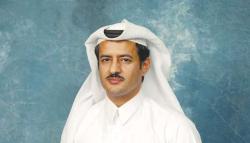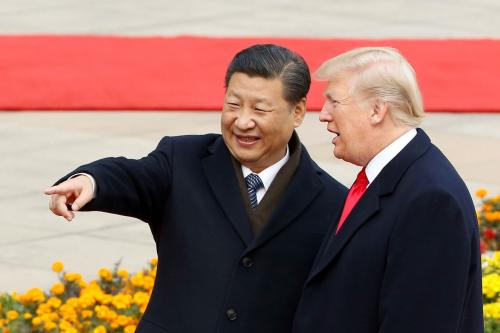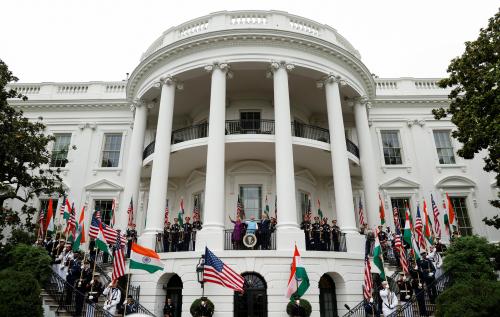

2:00 am AST - 3:30 am AST
Past Event
Content from the Brookings Doha Center is now archived. In September 2021, after 14 years of impactful partnership, Brookings and the Brookings Doha Center announced that they were ending their affiliation. The Brookings Doha Center is now the Middle East Council on Global Affairs, a separate public policy institution based in Qatar.
The Brookings Doha Center (BDC) hosted a panel discussion on September 10, 2018 to examine the status of economic diversification among the countries of the Gulf Cooperation Council (GCC). The panel addressed the following questions: How can GCC countries diversify their economics to meet the challenge of low and volatile hydro-carbon prices? What are the economic and geopolitical consequences of abundant global oil supplies on the GCC? How can GCC countries kickstart and accelerate their moribund economic transitions?
The panel included a group of distinguished experts including Hatem Al-Shanfari, professor of economics and finance at Sultan Qabus University; Khalid Al-Khater, researcher at the Institute for New Economic Thinking at the University of Cambridge; Nader Kabbani, senior fellow and director of research at the BDC; and Samantha Gross, fellow in the Cross-Brookings Initiative on Energy and Climate at the Brookings Institution. Tarik Yousef, senior fellow and director of the BDC, moderated the event, which was attended by members of Doha’s diplomatic, academic, and media communities.
Tarik Yousef opened the conversation by highlighting how, in spite of various differences in foreign policy, economic diversification remains a key objective and a source of unity among the GCC countries. One of the aims of the GCC, as an institution, was to bring about economic integration beyond oil and gas and to encourage economic diversification. However, the blockade has hurt this goal, and the Gulf crisis has dealt economic diversification a significant political and economic blow.
Samantha Gross described how the oil price collapse that began in 2014 concerned the countries of the region in the short-term, as many were forced to implement spending cuts and utilize financial reserves. In the long-term, she described how energy markets have moved into an “age of abundance,” mostly due to changes in the United States. While it is impossible to predict oil prices, a peak in oil demand is almost certain to come. Nonetheless, the Gulf region will remain a significant energy producer for the foreseeable future. Samantha Gross underlined two key points as she analyzed where the GCC stands in a world of energy abundance.
First, while oil and gas remain very inexpensive to produce, the prices needed to balance government budgets, or the “fiscal breakeven oil and gas prices,” are significantly greater than production costs. This is why economic diversification and fiscal reform remain crucial. They are necessary to decrease the fiscal breakeven prices and maintain the region’s competitive advantage in anticipation of falling demand and prices in the future. Second, she argued that adapting to a world of energy abundance involves a change in the social contract with citizens and the overall structure of the economy. This means making it less government-oriented with more space for private enterprise. She mentioned that transparency and rule of law are especially crucial in this process.
Khalid Al-Khater emphasized the political factors that are necessary for economic diversification and substantive reform. He argued that GCC governments generally focus on maintaining power rather than improving society, which produces a conflict of interest between the ruled and the rulers. Al-Khater then posed the question, how great is the gap between these two groups? He suggested that more development will encourage a more democratic system, as was demonstrated in the case of Asian countries like Singapore and South Korea. With more economic diversification comes more autonomy in various sectors. Overall, he contended that the decision of economic diversification seems more like a political decision than an economic one, since the politicians are the ones deciding whether it will happen or not.
Al-Khater went on to describe areas where reforms are lacking in the GCC countries. For example, human capital has a problem in terms of demand, not supply. Similarly, focusing on the quality of education rather than the supply of education is important. Employing graduates in appropriate jobs is a necessity. The public sector should also be linked to productivity. Appointing qualified personnel who are able to provide human capital and implement productive economic policies is important for economic diversification.
Hatem Al-Shanfari stated that GCC countries have a competitive advantage in oil that has been created over the years. It therefore makes sense to look within the oil sector to diversify. GCC countries have not been successful in creating local value, so they can turn to what they do best, which is oil and gas, to spearhead diversification. Oil and gas have a skilled local labor force that can go into different directions. He gave the example of Oman where it is necessary to pump water to be able to reach oil and gas. This has led to opportunities in thermal energy. Renewable energy is also an important sector to focus on. Thus, there are huge opportunities in sectors related to oil and gas, including research and development and financial institutions that cover oil and gas, which can help spearhead diversification efforts.
Al-Shanfari acknowledged that there are political limitations that prevent diversification. However, there are examples of attempts at diversification, such as in Qatar. He suggested that more needs to be done in the region to add value to products and promote localization in order to be a part of the global supply chain. This is what Gulf countries have been missing out on. He pointed out that there is not much time to spare now. So far, there has been a lot of luck in regard to oil prices, but how long can this luck last?
Nader Kabbani approached the issue of economic diversification by looking at the case of Qatar and discussed three points. First, employment needs to shift from the public sector to the private sector. Close to 89 percent of the Qatari national workforce is employed in the public sector or mixed sector. He noted, however, that the current Qatarization process has drawbacks. Qatar has a smaller population and lower unemployment rates than other GCC countries. It thus should focus on building human capital rather than setting quotas. Quotas can lead to circumstances where businesses rapidly promote young Qataris before they are ready or entice them away from other employers who might be a better fit.
Kabbani’s second point was about private sector development. Qatar can do more to create a viable environment for the private sector. Free zones that were created to encourage business development are often used by established Qatari companies that wish to avoid regulations. Qatar has among the highest rates of early stage entrepreneurial activity in the world, but the share of established enterprises (over 3 years) is low. In this regard, Kabbani cited problems with enforcement of contracts and access to credit. The third key point that Kabbani mentioned is wealth management. Qatar, at the national level, has a very high level of wealth. However, Qatar should diversify its income base by growing its sovereign wealth fund. Qatar should also encourage better wealth management at the household level. Debt is high among the average Qatari household. Long-term sustainability requires successfully passing wealth on to future generations.
The subsequent question and answer session focused on the various structural challenges to economic diversification, its political components, and the key challenge of implementation. The potential is there, but important debates on the social contracts in these countries; the models needed to successfully advance reforms; and building a new consensus between the public and political elites must be addressed. Overall, the session drew attention to the fact that political reform must go hand in hand with economic reform.


Landry Signé
May 27, 2025

Yun Sun
February 6, 2025

Tanvi Madan
November 4, 2024